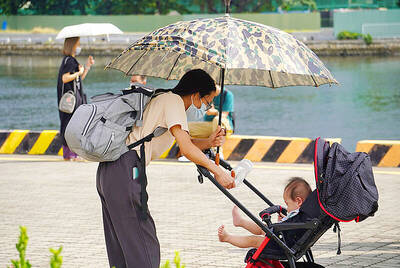Chiang Kai-shek International Airport was officially renamed Taiwan Taoyuan International Airport yesterday.
"The new name will become effective as of [yesterday]," said Minister of Transportation and Communications Tsai Duei (
Tsai made the remarks during a press conference held following the weekly Cabinet meeting yesterday morning. The airport code will remain TPE, Tsai said.
Speaking on behalf of Premier Su Tseng-chang (蘇貞昌), Government Information Office Deputy Minister William Yih (易榮宗) said that changing the airport's name to Taiwan Taoyuan International Airport reflected the will of local residents.
"The Taoyuan County Government and its residents have protested and requested changing the airport's name many times. In addition, most major airports in the world are named after big cities," Yih said.
The government is hoping that the Civil Aeronautics Administration and airlines will help promote the name change to the world, Yih added.
The airport name change recently drew attention after President Chen Shui-bian (
On a separate occasion that day, Su said that the airport name change was to be discussed and approved at yesterday's weekly Cabinet meeting.
"Taiwan Taoyuan International Airport" was actually the official name for the airport when construction was completed in 1979, Su said.
But then transport minister Lin Chin-sheng (
Terminal I of the airport was completed and opened on Feb. 26, 1979, while Terminal II was opened on July 29, 2000. Approximately 29 million passengers and 149,000 airplanes land and take off from the airport every year.

DEFENDING DEMOCRACY: Taiwan shares the same values as those that fought in WWII, and nations must unite to halt the expansion of a new authoritarian bloc, Lai said The government yesterday held a commemoration ceremony for Victory in Europe (V-E) Day, joining the rest of the world for the first time to mark the anniversary of the end of World War II in Europe. Taiwan honoring V-E Day signifies “our growing connections with the international community,” President William Lai (賴清德) said at a reception in Taipei on the 80th anniversary of V-E Day. One of the major lessons of World War II is that “authoritarianism and aggression lead only to slaughter, tragedy and greater inequality,” Lai said. Even more importantly, the war also taught people that “those who cherish peace cannot

Taiwanese Olympic badminton men’s doubles gold medalist Wang Chi-lin (王齊麟) and his new partner, Chiu Hsiang-chieh (邱相榤), clinched the men’s doubles title at the Yonex Taipei Open yesterday, becoming the second Taiwanese team to win a title in the tournament. Ranked 19th in the world, the Taiwanese duo defeated Kang Min-hyuk and Ki Dong-ju of South Korea 21-18, 21-15 in a pulsating 43-minute final to clinch their first doubles title after teaming up last year. Wang, the men’s doubles gold medalist at the 2020 and 2024 Olympics, partnered with Chiu in August last year after the retirement of his teammate Lee Yang

The Philippines yesterday criticized a “high-risk” maneuver by a Chinese vessel near the disputed Scarborough Shoal (Huangyan Island, 黃岩島) in a rare incident involving warships from the two navies. The Scarborough Shoal — a triangular chain of reefs and rocks in the contested South China Sea — has been a flash point between the countries since China seized it from the Philippines in 2012. Taiwan also claims the shoal. Monday’s encounter took place approximately 11.8 nautical miles (22km) southeast” of the Scarborough Shoal, the Philippine military said, during ongoing US-Philippine military exercises that Beijing has criticized as destabilizing. “The Chinese frigate BN 554 was

The number of births in Taiwan fell to an all-time monthly low last month, while the population declined for the 16th consecutive month, Ministry of the Interior data released on Friday showed. The number of newborns totaled 8,684, which is 704 births fewer than in March and the lowest monthly figure on record, the ministry said. That is equivalent to roughly one baby born every five minutes and an annual crude birthrate of 4.52 per 1,000 people, the ministry added. Meanwhile, 17,205 deaths were recorded, resulting in a natural population decrease of 8,521, the data showed. More people are also leaving Taiwan, with net